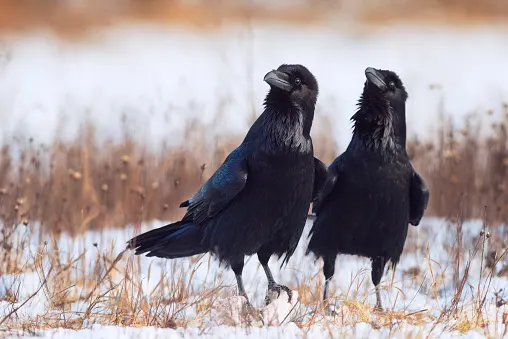
Ravens' bad moods might be contagious
Have you ever gotten the impression that a group of passing ravens—fittingly referred to as an unkindness—might be scowling at you? Well, now you have a reason to assume so. According to a study conducted out of the University of Vienna, negative emotions appear to be contagious among ravens. The study examined how ravens reacted to the negative emotions of their fellow birds, concluding that they were able to identify and even share negative emotions.
“Ravens are the perfect model to study social cognition and emotions,” writes study lead Jessie Adriaense in an email. “They live complex social lives in which, on top of a cognitive capacity, they have to be emotionally in tune with one another.”
Summer revealed! Visit our Complete Guide to Summer 2019 for an in-depth look at the Summer Forecast, tips to plan for it and much more
According to Adriaense, ravens mate for life, choosing one partner for the purposes of reproduction and defending their territory. “Such tightly knit relations in both the complex group life as well as in their pair bond suggest an emotional or at least social understanding of their environments,” she writes.
The researchers chose to test the ravens using a cognitive bias test, which originates from research in clinical psychology. The test has been used on people with depression and anxiety who tend to show “pessimism biases,” such as judging more negatively, remembering more negative events, and paying more attention to negative wording. “The idea here is that emotions bias or influence cognition, and also cognition biases emotions such as when we appraise our emotions or emotional situations,” Adriaense writes.
The researchers observed whether ravens reacted positively or negatively to neutral stimulus. Eight raven pairs were presented with two boxes. One box contained a cheese treat and the other was empty. Once the birds had become familiar with each box, a third box was introduced in a different location. Researchers then noted whether the birds reacted positively or negatively to the third box.
BELOW: PAIR OF RAVENS ENJOYS 'SPRING' WEATHER IN ALBERTA
SEE ALSO: Five of the angriest-looking birds
The next step in the test was offering one bird in each pair either a bland carrot or a delicious dog treat. The second bird in the pair watched their partner’s reaction from a separate compartment without being able to see which piece of food their partner had received. This step was then repeated with the observer bird being offered either the carrot or dog treat. The birds that had witnessed their partner’s disappointed reactions to the carrot took twice as long to approach their own food.
Adriaense says that this test shows that ravens, similarly to primates, “have evolved complex cognitive abilities to deal with the challenges of these socially complex environments.” By socially complex environments, she means environments where animals bond as pairs, take care of offspring together, and respond to predator threats together. A raven’s ability to be affected by another bird’s negative emotions suggests that their “social interactions may not just be cognitively driven, but also emotionally.”
The test, however, did not prove whether positive emotions are transferable among ravens. “Positive emotions are more difficult to measure or detect in animals and also more challenging to induce,” Adriaense writes. But based on observational research, she concludes that positive emotional transference is likely present in ravens, and drives certain social bonding behaviours.
ICYMI: Rare half-male, half-female cardinal spotted by bird-lovers
Moving forward, the study opens a number of avenues for further investigation. Raven’s are the only corvids (the family of birds they belong to) that have been tested, raising questions about other birds, such as crows, jays, and magpies. As for Adriaense, she wants to study how and when emotional states drive behaviour in animals. “It has been suggested that emotions might be important drivers for behavior, but the precise details of this are still unclear.”
The article was originally written for CottageLife.com by Andrew Cruickshank.









